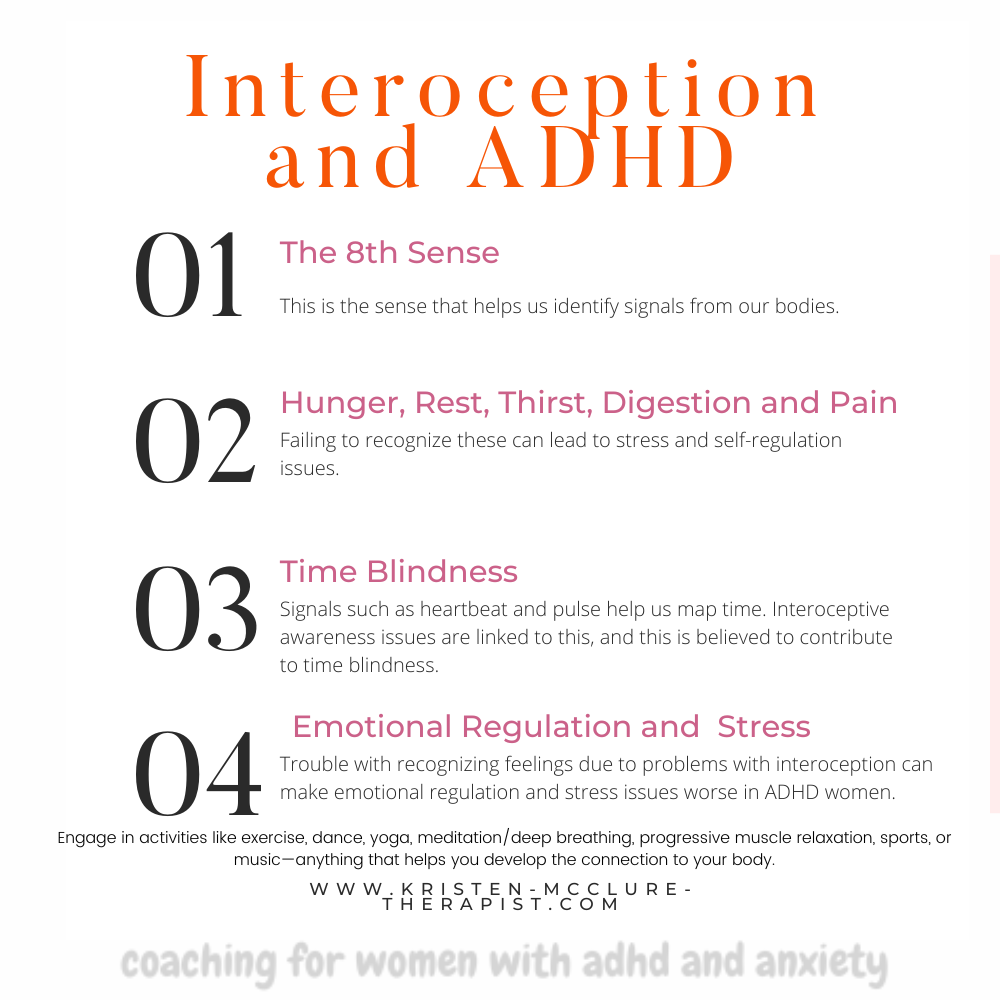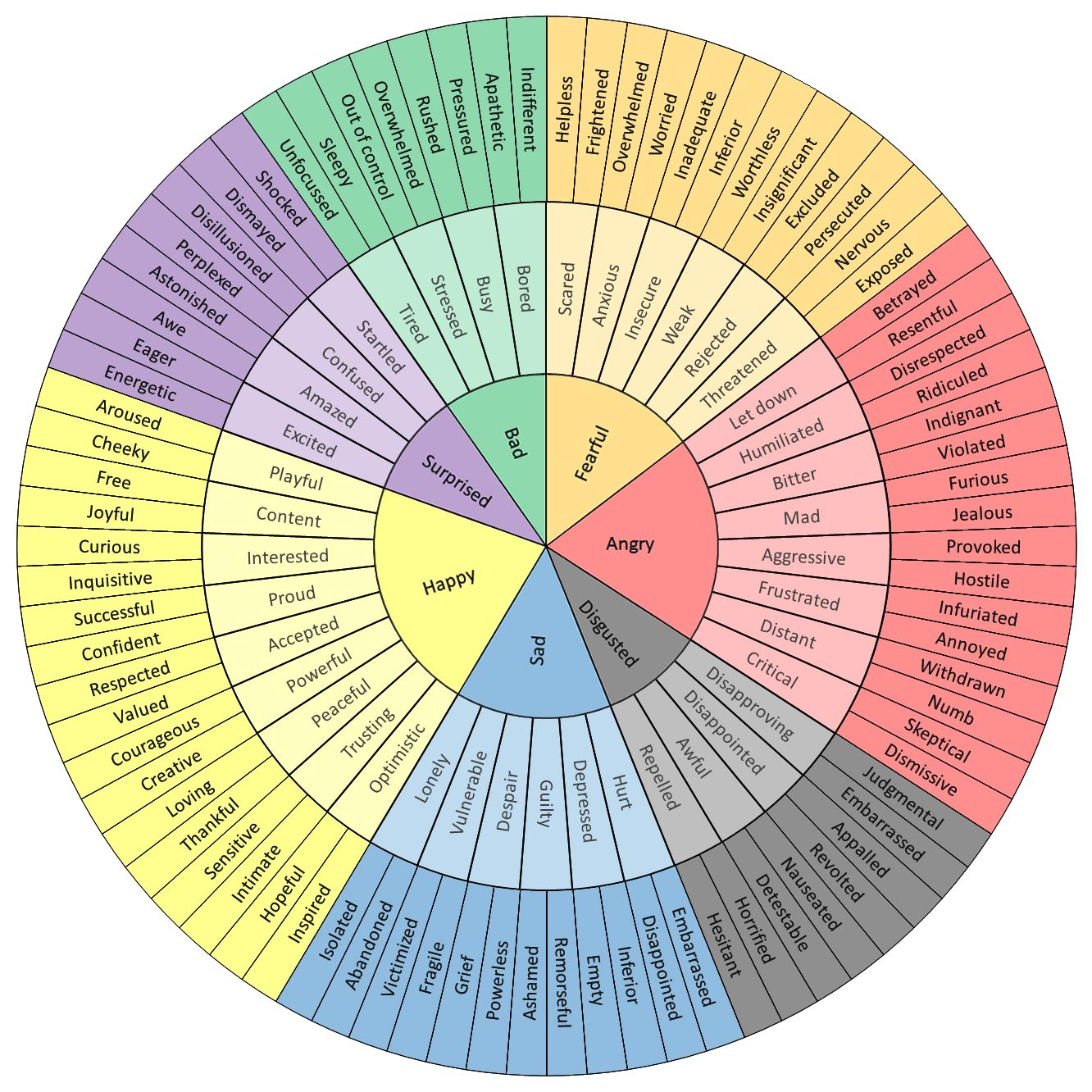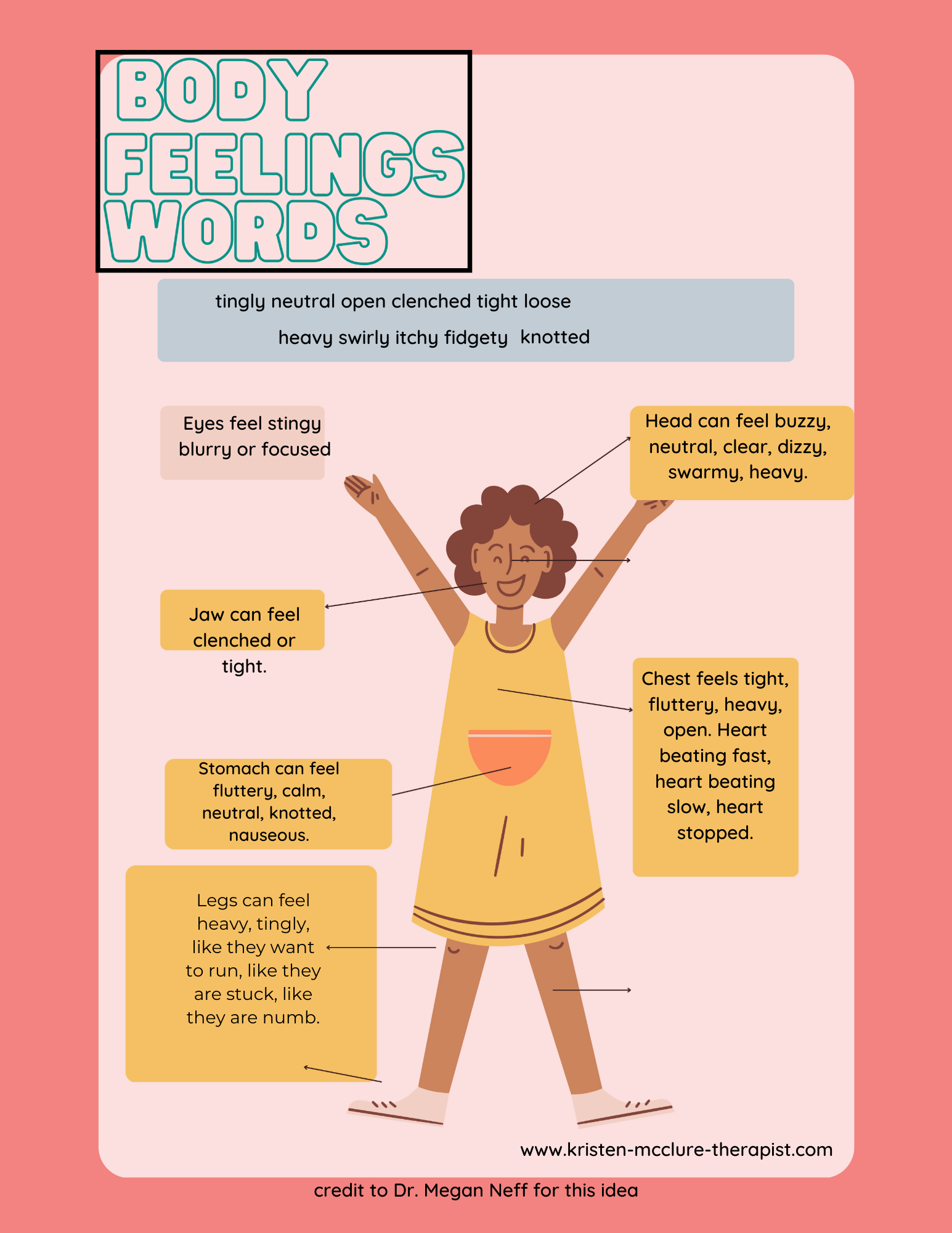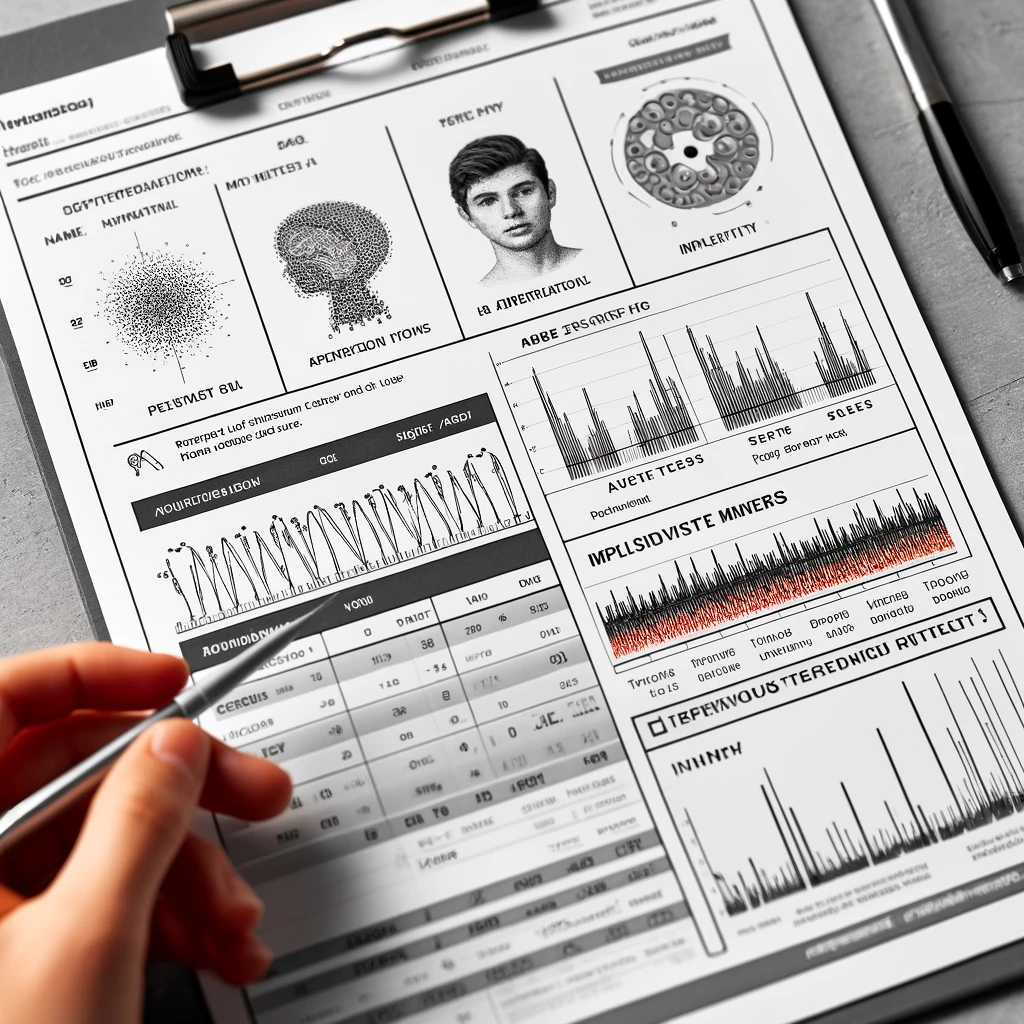ADHD and Interoception Self-Care Tips for Women
Understanding Interoception
Interoception is a word that explains how your brain knows and senses what's going on in your body. Shockingly, there isn’t more discussion on the relationship between interoception and ADHD. It helps encapsulate what we mean when we say neurodivergent people have a different nervous system. It also contributes significantly to our understanding of ADHD and how people experience the world.
How Interoception Influences Daily Life
Some things that interoception helps you do include:
- [ ] Notice your heartbeat
- [ ] Recognize whether you are hungry or thirsty
- [ ] Identify feelings in your body, such as nervousness
- [ ] Monitor your breathing rate and whether it is shallow or deep
- [ ] Observe whether your muscles are tense or loose
- [ ] Notice early signs of pain or discomfort
- [ ] Sense changes in temperature, like being too hot or cold
- [ ] Pay attention to digestive sensations, such as fullness, bloating, or emptiness

Good interoception helps you notice early signals of these bodily needs, while poor interoception can lead to detecting them only when they become urgent.
Without good interoception, you might miss early signs of stress, essential emotions, pain, discomfort, and the need for self-care.
Interoception is considered one of the senses. It helps you gather information about what you need internally to act in ways that assist you.
Interoception and ADHD: What's the Connection?
We know from something called the heartbeat perception task, a task that measures interoception, that ADHD people score lower and have less accuracy.
Another test, called fMRI, shows that ADHD people have reduced activation in two parts of the brain involved in interoception: the insula and the anterior cingulate cortex. These parts of the brain generate emotions and sensations in your body.
Much more research is needed in this area, but it’s highly significant for ADHD people to understand that trouble with this feedback loop may be an area where they struggle.
Assessing Your Interoceptive Awareness
If you'd like to take an interoceptive awareness quiz, I found this tool called Multidimensional Assessment of Interoceptive Awareness version 2 (Maia 2). This tool will help you understand your interception issues and identify where you might need to build these skills. This site will score your tool online, and you can also download a paper version.
The Impact of Poor Interoception on ADHD Symptoms
Problems with interoceptive awareness contribute to several challenges for individuals with ADHD:
Emotional Regulation and Stress Management Challenges
Emotional regulation and stress management issues can arise when you don’t feel or identify early signs of stress, such as changes in your muscles, heartbeat, or pulse. This makes it harder to recognize signs of overwhelm or notice the buildup of emotions and stress until it's too late.
Self-Care Difficulties
Self-care issues can occur because you may not know that you need to eat, drink, rest, or care for yourself. ADHD people might miss these signs due to a prediction error. The brain isn’t able to check in with the body and accurately read signals. As a result:
- You’re suddenly really tired without noticing it gradually.
- You’re starving suddenly, even though you didn’t feel any early signs of hunger.
- You feel emotionally overwhelmed before you realize your body was stressed.
Time Blindness Time Perception Issues
Time blindness is also believed to be partly due to interoception issues, as accurate time perception often depends on the ability to tune into bodily rhythms like heartbeat, breathing, and hunger cycles. If these signals are more challenging to sense, the sense of time passing can become distorted.
Eating Disorders and Sensory Processing Disorders
Disrupted interoceptive signals can also contribute to eating disorders. When it’s difficult to recognize hunger and fullness cues, irregular eating patterns can result, such as eating too much or too little. This miscommunication between the brain and body can cause emotional dysregulation, as the brain struggles to make sense of its needs. Emotional states like anxiety or stress can then be mistaken for hunger, leading to overeating, or hunger might not be recognized at all, leading to undereating.
Additionally, sensory processing disorders can intensify these challenges, as individuals with ADHD may experience heightened sensitivity to certain textures, tastes, or even sensations like temperature, which further complicates their relationship with food and self-regulation. These combined difficulties can create a cycle of emotional dysregulation that impacts overall well-being.
4 Tips to Build Interoceptive Skills When You Have ADHD
The good news is you can build skills to help yourself with Interoception.
Awareness of the connection between your mind and body is one way to build interoceptive skills. This can be done in two simple ways and can be practiced.
-
Practice Body Scan Meditations
The first way is through body scan meditations. There are many of these online, but Kelly Mahler is the OG of Interoception, and she says you need to tailor these scans more appropriately for neurodivergent people. Here is an example of how this would be done
Body Scan Meditation: Focus your attention on different parts of your body, noticing any sensations. This helps improve awareness of bodily signals over time.
Customized Body Scan Meditation Script for ADHD women to build interoception Welcome! Let's embark on a journey to explore the sensations in your body in a way that feels comfortable and enjoyable for you. Remember, there are no rules here—just opportunities to connect with yourself. Feel free to move, play, and let your attention go where it wants.
Step 1: Find Your Comfort ZoneStep 2: Start with an External Body Part
- Begin by choosing a place and position where you feel at ease. You might sit, stand, lie down, or even move around.
- Engage in an activity that feels good: stretch, sway, dance, cuddle with a pet, or simply breathe.
Step 3: Be Playful with Movement
- Let's focus on your hands. Look at them, wiggle your fingers, or clap softly.
- Feel the texture of something nearby—perhaps run your fingers over a soft fabric or a cool surface.
- Notice any sensations: warmth, coolness, tingling, or pressure.
Step 4: Describe Your Feelings
- Move your hands in different ways. Pretend you're playing an invisible piano or molding clay.
- Pay attention to how these movements feel. Is there a sense of freedom, stiffness, or something else?
- Let any movements be natural and enjoyable.
Step 5: Let Your Attention Wander
- As you engage with your hands, think about how to describe the sensations.
- Do they feel like they're buzzing with energy or as light as feathers?
- What colors, images, or even animals come to mind when you focus on your hands?
- Remember, there's no right or wrong—just whatever feels true to you.
Step 6: Engage Other Senses
- Allow your focus to shift to another part of your body that draws your interest.
- Perhaps it's your feet. Wiggle your toes, feel the ground beneath you, or stand on your tiptoes.
- Notice the sensations in this new area just as you did before.
Step 7: Explore Internal Sensations (If Comfortable)
- If you like, involve other senses. Listen to the sounds around you or notice any scents.
- How do these sensory experiences affect the sensations in your body?
- Maybe certain sounds make you feel relaxed or energized.
Step 8: Express Your Experience Creatively
- If it feels right, gently bring your attention inward.
- Notice your breathing. How does the air feel as it enters and leaves your body?
- Place a hand on your chest or stomach. Do you feel movement there?
Step 9: Continue Freely
- Describe these internal sensations in your own words.
- Perhaps your breath feels like gentle waves or a soft breeze.
- Allow any thoughts, images, or emotions to surface without judgment.
Step 10: Conclude Your Exploration
- Continue to explore different parts of your body at your own pace.
- Move, stretch, or remain still—follow what feels good to you.
- Let your attention flow naturally, spending as much or as little time as you like on each area.
- When you're ready, gently bring your awareness back to the present moment.
- Take a deep breath and notice how you feel overall.
- Acknowledge the time you've spent connecting with yourself.
Remember:
- This is your personal exploration. There's no need to follow a strict order or method.
- Embrace playfulness and curiosity. Let go of expectations.
- Your descriptions and experiences are unique to you and valid just as they are.
- You can return to this practice anytime, adapting it in ways that suit you best.
Thank you for taking this time for yourself. May this practice bring you closer to understanding and appreciating the wonderful sensations your body offers.
2. Perform Interoceptive Check-Ins
Simple Steps to Tune into Your Body
These are simple checks where you ask yourself what's happening in your body. They help build awareness of your internal state.
- Set Gentle Reminders
- Choose Moments: Pick 2-3 times during the day to pause—for example, morning, midday, and evening.
- Use Prompts: Link check-ins to routine activities like meals or breaks.
- Pause for a Minute
- Stop Activities: Take a brief break from what you're doing.
- Take a Deep Breath: Inhale slowly and exhale to help center yourself.
- Ask Yourself Three Questions
- Am I Hungry?
- Notice if your stomach feels empty or if you're thinking about food.
- Am I Thirsty?
- Check if your mouth feels dry or if you'd enjoy a drink of water.
- Am I Tired?
- Observe if you feel sluggish or if your eyes feel heavy.
- Respond to Your Needs
- Take Action: If you recognize a need, address it—have a snack, drink water, or rest briefly.
- Be Kind to Yourself: Acknowledge that taking care of your needs is okay.
Tips:By integrating these easy steps into your day, you can gradually build a habit of paying attention to your body's internal cues without feeling overwhelmed.
- Keep It Simple: Focus on just these three questions to start.
- Be Patient: It might take time to tune into your body's signals.
- Consistency Helps: Regular practice can make it easier over time.
3. Enhance Emotional Literacy


Using a Feelings Wheel
Practice linking physical sensations to emotions. For example, a tight chest might mean you’re feeling anxious. You can use the feelings wheel to label and take a picture of the sensations in your body to help with this.
Noting Bodily Sensations
Write down what your body feels and try to connect it to your emotions. This can help increase self-awareness.
4. Incorporate Sensory Breaks
Planning Short Breaks to Manage Overload
Plan short breaks throughout the day to manage sensory overload, especially in noisy or chaotic environments. This helps reset your internal balance. You may need to set a timer to remind yourself to do this, just like with your sensory check-ins.
These are a few ideas for you to start building interception as an adhd woman.
Take small, consistent steps toward reconnecting with your body, and be patient with yourself as you build these skills. Remember, the journey to better interoception takes time and practice, but each step brings you closer to feeling more in control of your emotions, energy, and well-being.






